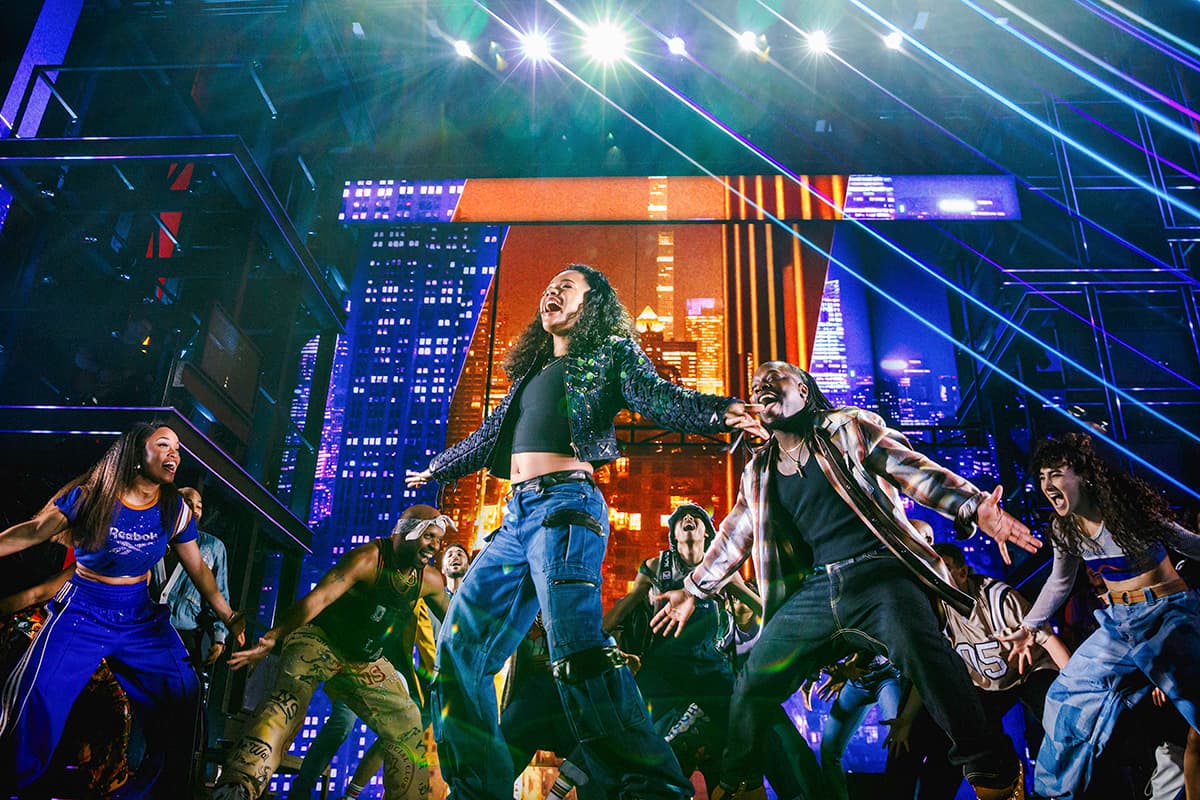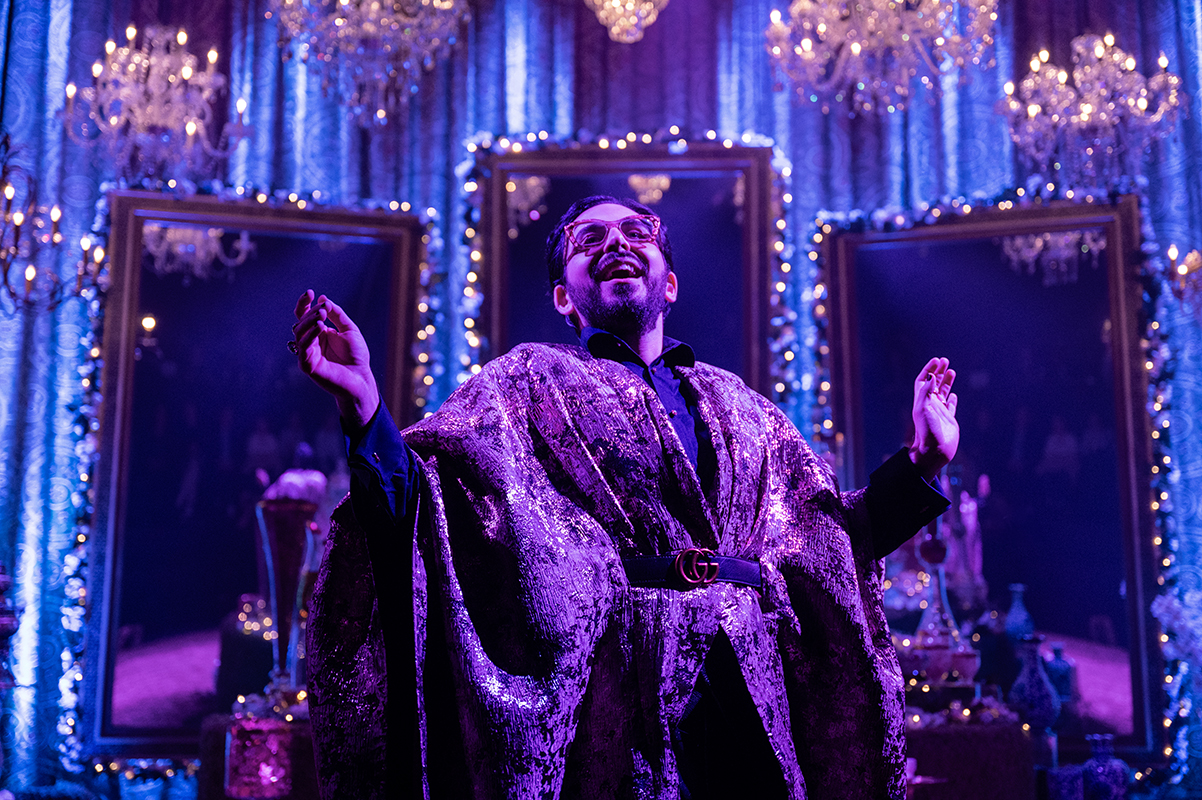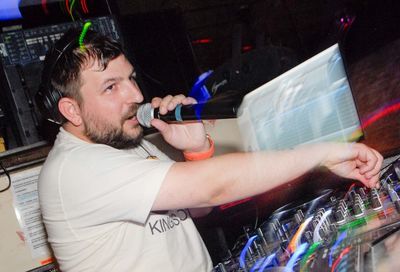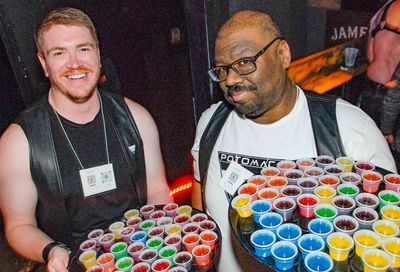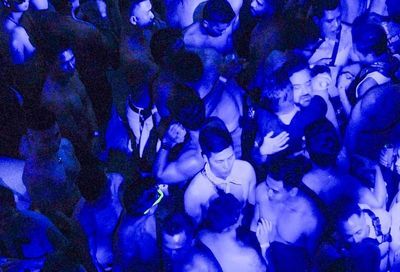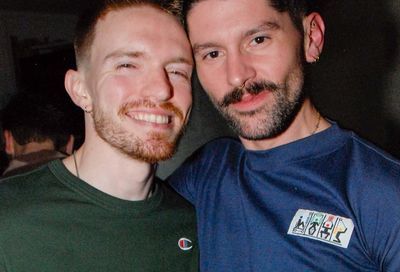Desiree Akhavan: Entirely Appropriate
Desiree Akhavan sees filmmaking as a way to connect to other queer outliers

Desiree Akhavan seems like a perfectly happy, well-adjusted person. Yet she seldom goes shopping without feeling a little sad.
“It’s an experience I’ve had many, many times,” Akhavan explains. “I go shopping and I let a sales person trick me into believing I can purchase happiness.” She’s susceptible no matter whether she’s shopping for clothes at Ross, cosmetics at Duane Reade, or supplements at Vitamin Shoppe. “Suddenly it’s like, ‘Oh, you mean I’ve been doing everything the wrong way? And if only I purchase the right tools, I’ll be okay?'”
Many times in her life, Akhavan has been told she’s doing something the wrong way. Or that she’s not right in some way. Although downright stunning in her film Appropriate Behavior, she was unceremoniously crowned “the ugliest girl” in high school. Throughout her life she’s been considered either too radical — for fellow Americans of Iranian descent, for example — or too traditional — for queer students at Smith College. A New Yorker by birth, Akhavan was raised in a non-religious household by parents who gave up their Muslim faith after fleeing their native Iran 35 years ago. Akhavan is also a true bisexual — she can’t remember a time she wasn’t attracted to both men and women. What she can remember is wondering if she “had the courage to pursue” a bisexual identity.
Akhavan’s experience of not fitting in has only fueled her desire to be a filmmaker and to share her life stories. A few years ago, she generated buzz for co-creating the comedy web series The Slope, about “a pair of superficial homophobic lesbians in love.” And she’s currently developing two queer-themed projects for film and TV.
This Friday, March 20, Reel Affirmations will screen Akhavan’s debut film, which had its premiere last year at Sundance. At that time, the mainstream press started referring to Akhavan as “the next Lena Dunham.” Since then she’s actually appeared in a small role in Dunham’s hit HBO series, Girls. There are certain obvious similarities between Girls and Appropriate Behavior, but at root is a style and sensibility obviously shared by these two millennial, native New Yorkers. “The shows I love play with sadness in such a funny way,” Akhavan says. “They walk that fine line between drama and comedy quite nicely.”

METRO WEEKLY: I understand Appropriate Behavior started as your thesis project at NYU. What inspired you to make it?
DESIREE AKHAVAN: I wanted to make a film that reflected my life — that was true to the themes and issues I was dealing with — but also was a comedy about love and the universal themes that films have been mining forever. So, a romantic comedy that could speak to me and my experiences. There’s so little out there that I feel reflects my point of view.
MW: Your point of view as a bisexual and a child of immigrants in America?
AKHAVAN: Yes, but even just my experience of New York, my perspective in comedy. Those things are also kind of different. I think people get really caught up in the outliers of being gay or being Iranian, but it’s more than that. The tone of the film is really experimental in some ways. It’s traditional in others. Nothing out there really spoke to that perspective of the world, which is kind of a satiric look at dating in New York right now.
MW: And Woody Allen was an inspiration?
AKHAVAN: Yeah, for sure. Definitely Annie Hall. I wanted to make a film about a couple that you knew from the get-go wasn’t going to be able to stay together. And yet you’d still find yourself rooting for them.
MW: I’ve heard you comment you never thought about putting somebody else in the film’s starring role.
AKHAVAN: No. It would seem disingenuous to hire a better-looking version of myself to do an impression.
MW: Is acting something you always wanted to do?
AKHAVAN: When I was a kid I really wanted to act, up until I was a teenager. And then I met with some agents and it became apparent that because of the way that I look, it would be a hard profession for me to excel at. I mean it’s a very specific kind of girl who walks into a room and lights it up and everyone’s like, “We’ve got to cast her!”
I’m really glad I had that experience of people being like, “You’re too ugly to act.” Because at the end of the day, it’s not a job you have control over. You keep putting yourself in other people’s hands. And I think I would have gone insane if I had pursued that. But being in a position to enable yourself to do whatever role you want to do is really exciting. The idea of auditioning and waiting for someone else to see potential in me and give me a platform is not something I’m interested in.

MW: Well I would never consider you unattractive. I don’t see it. But I gather you had that experience in school.
AKHAVAN: Quite a lot.
MW: Is that because you looked ethnically different to everybody else?
AKHAVAN: I grew into my face and my body. I was just legitimately not attractive, but also I came from a community of people who have very strict ideas of what’s beautiful. The Persian community has one idea of beauty, and the New York prep school community has one idea — they’re different ideas, but they’re very specific. And neither one is one I fit into.
MW: And where was it that they actually gave you a title?
AKHAVAN: It was my high school, as the Ugliest Girl at Horace Mann. It was on the Internet, at the time when people were beginning to get accounts set up. And it was a really shitty, rinky-dinky site that people could vote in on.
MW: It’s the type of experience gay people can relate to — similar to being teased or bullied. As long as you can survive it, it makes you stronger.
AKHAVAN: Yeah, completely. I think people find different ways to digest that kind of experience. I instantly felt like I wanted to take power of it and put it into my own narrative. It was after that experience that I wrote my first play.

MW: Was there a particular moment in your life when you realized you were bisexual?
AKHAVAN: I think you always know these things about yourself. I always knew I had the potential to fall in love with a man or a woman. I didn’t know if it was something that was going to be a part of my life until I was older. I wasn’t sure if it was something that I had the courage to pursue.
MW: Yeah, bisexuality is a more complicated concept, one mostly unseen or unexplored in film or pop culture in general.
AKHAVAN: It’s definitely weird, uncharted territory because it’s not a tangible thing you can follow or explain. I think it’s easier for straight people to wrap their brains around what it means to be gay because you can care a great deal about the same sex the way that they feel about the opposite sex. But when you’re a bisexual person, there’s this implication that you’re disingenuous, that you must be lying to someone, and that you don’t quite understand your own feelings, because you haven’t chosen where your priorities lie.
MW: In the film, your brother calls your character “a sexually confused narcissist.” Have you had that term thrown at you before?
AKHAVAN: [Laughs.] No, but I’m sure it’s what my brother actually thinks of me.
MW: So although not autobiographical, there are clear antecedents in the film’s story drawn from your own life.
AKHAVAN: I take the kernel of what’s fascinating, or distinct, about my life and then try to elevate it into a narrative that’s far more interesting and cinematic than my own. It’s not interesting to have a diary entry. If I just shared my life, I don’t think anyone would give a shit. But taking those elements — like the relationship I have with my brother, which is super-loving but also really harsh. We like to put each other down a lot — that’s sort of our way to communicate love, through insults.
So I have an older brother, who is a doctor. He’s very similar to the character, but my parents aren’t like their characters at all. I never was closeted with them. I never lived with someone and lied about it. Those are not experiences that we had together, but it fit really well into the story of Maxine and Shirin. What device could we use to make this couple seem like they could never be together? Shirin was closeted, while Maxine was a staunch believer that her sexuality was the first and foremost quality of her life that she had to be loyal to — she identifies queer over everything. I’ve never dated someone like that. I don’t think anyone like that would be interested in dating someone like me because they usually tend to be quite sensitive and don’t like my sense of humor.

MW: Because you would make fun of them, the way you make fun of yourself?
AKHAVAN: Yeah, I make fun of myself, I make fun of the communities I belong to. I find humor in those things. I like dating people with a really good sense of humor about themselves.
MW: It’s a sign that someone is confident and comfortable in their own skin and identity. There’s an example in the film, an intimate scene in which Maxine, instead of saying “I love you” on the count of three, opts for a joke — “I’m thinking of transitioning to a man.” That was a clever way of playing with people’s expectations.
AKHAVAN: Thanks. I love that line, too. It’s actually gotten me a lot of trouble in the past year — Some people are really offended by it. I don’t think the butt of the joke is the trans community, I think I’m the butt of the joke — the expectations of romance. It’s a commentary on a lot of things. And it’s totally within realm that she could have been gearing up to say that she wanted to transition. That’s something that wouldn’t have been so far off base.
MW: There’s a concept the film jokingly calls “lesbian orphan propaganda,” but ultimately is a real thing gay people, particularly older gay people, talk up: The whole notion of creating a second family made of friends if the family we were born into rejected us. What inspired you to include this?
AKHAVAN: That was a scene in which my character was being particularly venomous. It is a thing — a lot of people lose their families. And you have to build your own, and that’s not propaganda. It was a funny, mean thing for Shirin to say, but it’s not in line with my beliefs. I don’t think it’s propaganda — I think it’s real. The real conflict I wanted to show there was that Shirin is in direct contrast. She’s trying to maintain the relationship with her family. She can’t cut it off, the way that Maxine has the benefit of. That’s the difference between being from an immigrant culture and not.
Americans more easily cut off ties with their families — in my opinion, it’s what I’ve noticed. It’s as painful and difficult as losing a limb, but it’s still something I’ve seen happen. Whereas with Persian families, or any other culture that comes here, you will put up with anything just to be a good kid. Just to sustain your relationship with your family. That whole scene was about the fact that Maxine thinks it’s a possibility to cut out your family and Shirin doesn’t.
MW: Is it rare to see someone of Persian descent who doesn’t remain close to their family?
AKHAVAN: I’m not even talking Persian. I’m talking immigrant. You put up with a lot. Your priority at the end of the day is to please these people who went through hell to give you a better life. And it’s an experience that is really specific to being the child of immigrants — that you’re always, always aware of the fact that sacrifices are made for you, and that you owe so much to the people who got you to this world. And I don’t think that same feeling exists when your parents are from this country. I don’t think that dynamic will exist between myself and my children. To have survived war, and to have left everything you have and make the sacrifices so your children can live a very different life, a much more privileged life, is something that every child of immigrants is aware of, from whatever culture they come from.
MW: When did your parents emigrate from Iran?
AKHAVAN: I believe it was 1980, during the Iranian revolution. They went to France. They spent two years there and came to America in ’82 or ’83.
MW: Back to the topic of creating a second family, I wondered: Do you have that? I mean, some gay people pride themselves on creating a stronger bond with their friends, which I don’t think straight people tend to do as much, historically not anyway. I just wonder if being bisexual might complicate that for you in some way?
AKHAVAN: I agree with that sentiment, and I think that’s true. I think the issue that I’ve had in my life and that I wanted to portray in the film is that I don’t fit into that community either. And I never have. I went to Smith College, an incredibly gay school, and I wasn’t gay enough for it. And my values, and my humor, and my life, just didn’t ever fit into that. And it was to me just as oppressive and just as social-climbing/hierarchical as the New York prep school scene. Especially being bisexual, especially being feminine, I just did not find a home there. And I think I’m really searching for my home, in general. And that’s what this film is about — putting into words that search.
MW: Is that what drew you to Brooklyn, given its reputation as a haven for creative types?
AKHAVAN: I couldn’t afford rent anywhere except for in Brooklyn, and that’s how I found myself there. And I lived with other filmmakers, and found a community of filmmakers there that felt like home for a while — until it didn’t. And that really led into a very nomadic year of traveling and trying things out and seeing what other countries I like. It’s been a really interesting journey. Especially because I’m traveling with a film that’s so personal. This whole thing is incredibly self-indulgent.
MW: Do you like the nomadic lifestyle?
AKHAVAN: I like it for now. I don’t think I could sustain this for more than another year.
MW: I trust you didn’t travel with the film to Iran, but do you ever go there? Or still have family there?
AKHAVAN: I used to go in summers to visit my family — cousins, my grandmother and my uncle live there. But I haven’t been back in years, and I don’t think it would be safe to go there now. It’s against the law to be out and gay, so I would not do it.

MW: Are you, or is anyone in your family, political, or engaged at all in that situation and trying to change it?
AKHAVAN: Yeah, I mean everybody was really involved in the Green Movement, but now — that was in 2009, and things are shifting, and it’s like a different thing to be political now. The Arab Spring kind of came and went. Iran wasn’t really — I don’t know, we got kind of overlooked in that experience. I know a lot of people who are politically engaged and involved, but from my perspective, which is a very distant one, it seems like a lot of that hope got sucked out of the movement.
MW: What’s next for you?
AKHAVAN: I have two projects I’m working on right now. One is a feature film that I’m writing with my producer in London. And the other one is a television series that I’ve been developing for a while, and that I worked on at the Sundance Labs. They’re very different, but they both have queer themes. I didn’t set out to be this queer filmmaker, but the stories I’m attracted to are stories that haven’t been told before, and that’s what I think ties these two projects together.
The television series is about a lesbian who comes out as bisexual in her 30s and deals with the fallout of that lifestyle change. The other one, I can’t say what the plot is yet because it’s an adaptation of a young adult novel.
MW: Is TV inspiring you a lot today?
AKHAVAN: Oh god, yeah. I’m so inspired by everything. I really love Louie, that’s my favorite show. I also really love Broad City — it’s so crude and absurdly funny. I also really love Girls. It has this sadness that makes me ache sometimes — whenever they have episodes especially with the parents, it really touches me on a deep level. I feel like the shows that I love play with sadness in such a funny way. They really walk that fine line between drama and comedy quite nicely. Like Transparent does it too. It’s very exciting, as well as becoming more honest.
MW: One last thing. What about the future? Do you hope to have a family and kids?
AKHAVAN: Yeah, I do. I would very much like to do that.
MW: How far in the future for that, any idea?
AKHAVAN: Oh, god. Who fucking knows? Things happen as they happen. I’ve been asking myself that a lot lately, because I just turned 30. I just think it’s stupid to put plans — I think you should work towards goals, but to have expectations is only going to break your heart a little because who knows how things happen and when they happen? Who knows how motherhood or how a permanent, monogamous partnership is going to happen for me, or whether or not it will? I can’t base my joy on it. I can base my joy on being a really good friend, or trying to be the best person I can, trying to be the best daughter I can, or trying to make all the work I want to make.
I really do believe that if you keep checking in with yourself and keep doing the things you want to do, things fall into the place that they’re supposed to. Perhaps that’s naïve, and in 10 years I’ll be sad that I didn’t have a checklist of things to accomplish by 35, but I could never think strategically about having kids at this stage.
Reel Affirmations presents Appropriate Behavior in two screenings on Friday, March 20, at 7 p.m. and 9:15 p.m., at the Human Rights Campaign, 1640 Rhode Island Ave. NW. Tickets are $10 for general admission or $25 for VIP including one cocktail, one popcorn and special seating. In addition, a chef’s tasting will follow the 7 p.m. screening courtesy of Tasteful Creations from Chef B. Call 202-682-2245 or visit reelaffirmations.org.
Support Metro Weekly’s Journalism
These are challenging times for news organizations. And yet it’s crucial we stay active and provide vital resources and information to both our local readers and the world. So won’t you please take a moment and consider supporting Metro Weekly with a membership? For as little as $5 a month, you can help ensure Metro Weekly magazine and MetroWeekly.com remain free, viable resources as we provide the best, most diverse, culturally-resonant LGBTQ coverage in both the D.C. region and around the world. Memberships come with exclusive perks and discounts, your own personal digital delivery of each week’s magazine (and an archive), access to our Member's Lounge when it launches this fall, and exclusive members-only items like Metro Weekly Membership Mugs and Tote Bags! Check out all our membership levels here and please join us today!





